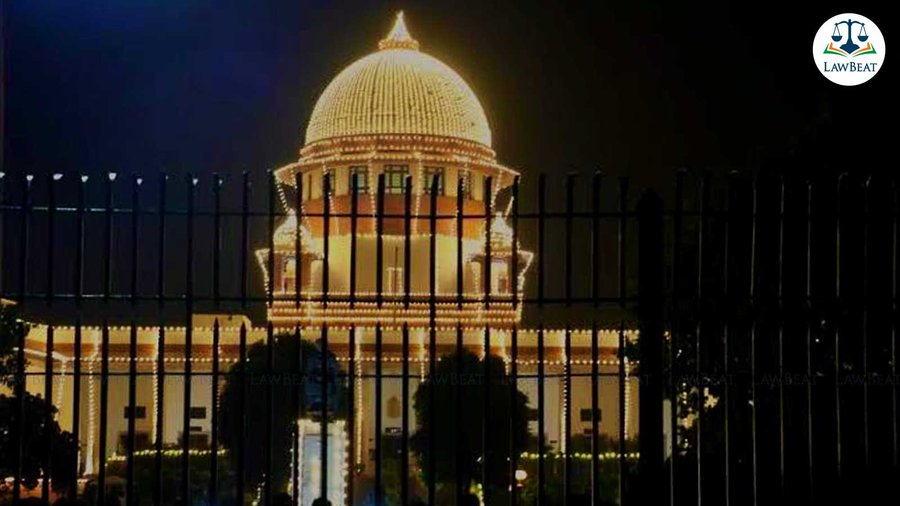SC Tightens Rules on Surrender Exemptions, Refers Matter to CJI

Court sought to address the apparent anomaly in listing of petitions seeking exemption from surrender
The Supreme Court has given a categorical finding that an application seeking exemption from surrendering filed by convicted persons cannot be entertained or listed before the Judge-in-Chambers in any special leave petition, except where the petitioner has been sentenced to a term of imprisonment.
A bench of Justices Vikram Nath and Sandeep Mehta arrived at its conclusion by going through the Supreme Rules, 2013 and directed for placing its order before the Chief Justice of India for seeking formal instructions to the concerned filing, scrutiny and numbering Sections in respect of matters in which Order XXII Rule 5 of SC Rules, 2013 will apply.
The court here was dealing with a petition filed by Jasminbhai Bharatbhai Kothari against the order of October 19, 2023 passed by the Gujarat High Court, whereby the division bench had refused to extend the period of temporary bail granted to the petitioner in criminal appeal preferred by him, pending adjudication before the High Court.
The petitioner assailed the conviction and sentence awarded by Additional Sessions Judge, District Court Bhavnagar by its judgment of November 3, 2018, for the offences punishable under Section 302 of the Indian Penal Code, 1860 read with Section 34 and Section 25 (1) (B) (A) of Arms Act, 1959.
Dealing with the matter, the bench noticed an "apparent anomaly" in the listing of the petition and proposed to clarify and address the issue.
The court noted while preferring the present special leave petition, the petitioner also filed an interlocutory application seeking exemption from surrendering.
The said application was registered by the Registry and stood rejected by the Judge-in-Chamber by an order of December 8, 2023.
"We are of the prima facie opinion that the application could not have been entertained in the very first instance. Our conclusion is based on plain reading and interpretation of Order XXII Rule 5 of the Supreme Court Rules, 2013," the bench said.
The rules states that where the appellant has been sentenced to a term of imprisonment, the petition of appeal shall state whether the appellant has surrendered and if he has surrendered then the appellant shall, by way of proof of such surrender, file the certified copy of the order of the court in which he has surrendered or a certificate of the competent officer of the jail in which he is undergoing the sentence.
It further said a mere attestation of the signatures on the Vakalatnama from the jail authorities shall not be considered as sufficient proof of surrender. Where the appellant has not surrendered to the sentence, the petition of appeal shall not be accepted by the Registry unless it is accompanied by an application for seeking exemption from surrendering. Where the petition of appeal is accompanied by an application for exemption from surrendering, that application alone shall be posted for hearing orders before the Court in the first instance.
"On perusal of the Rule, it is clear that an interlocutory application for exemption from surrendering is admissible only where the petitioner in the special leave petition has been ‘sentenced to a term of imprisonment’ and not in any other situation. We have observed that the Registry of this court has been entertaining applications for exemption from surrendering in various other categories of cases, such as the rejection of anticipatory bail, rejection of a prayer for an extension of interim bail, etc," the bench said.
In the case of Mahavir Arya Vs State Government NCT of Delhi and Anr (2021), Justice P S Narasimha, sitting in Chambers, interpreted Order XXII Rule 5 of the SC Rules, 2013 and held that the said Order applies only to cases where the petitioner is ‘sentenced to a term of imprisonment’ and it cannot be confused with simple orders of cancellation of bail, the bench pointed out.
Similarly, in Kapur Singh Vs State of Haryana (2021), this court in a special leave petition, challenging the order of cancellation of the bail, dismissed the interlocutory application seeking exemption from surrendering on a similar rationale, the bench highlighted.
"In view of the clear language of Order XXII Rule 5 of the SC Rules 2013 and successive orders passed by this Court, we are firmly of the opinion that an application seeking exemption from surrendering cannot be entertained or listed before the Judge-in-Chambers in any special leave petition, except where the petitioner has been sentenced to a term of imprisonment," the bench said.
In facts of the present case, the court disposed of the petition, since the petitioner had already surrendered upon the rejection of the interlocutory application. Court held that the present special leave petition challenging the high court's refusal to extend the temporary bail had become infructuous.
Case Title: Jasminbhai Bharatbhai Kothari Vs State of Gujarat
